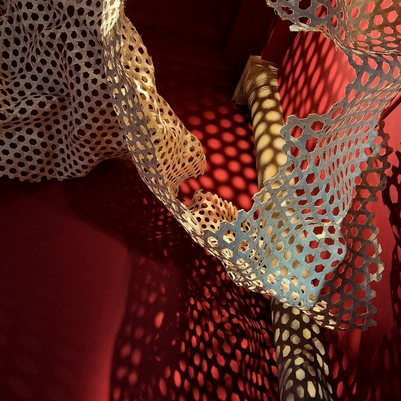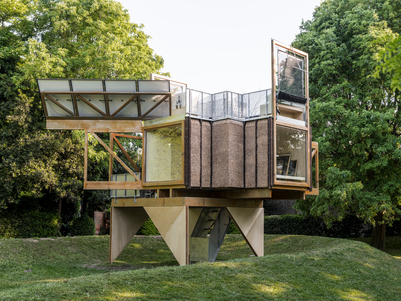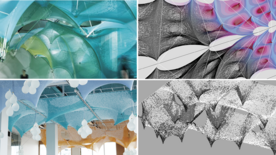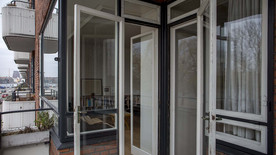

NAF/NAAR Symposium 2023 - Nordic PhD Research in Architecture
The Nordic Association of Architectural Research and the Royal Danish Academy – Architecture, Design, Conservation, Copenhagen
Call for Papers - Abstract extended deadline:
January 31st 2023
Creation of New Knowledge
Dialogues inside and between Disciplines
With a focus on 'transdisciplinarity', this symposium invites PhD students from the Nordic countries to present and critically reflect on their PhD projects in architecture, how they position themselves within the research context, and in which way such positioning resonates with the discourse of their PhD school and the PhD programmes they are enrolled in. It aims to ignite and encourage discussions between students, supervisors, invited guests, and keynote lecturers on the multitude and diversity of current research practices.
Theme and context
Theme and context
The symposium is a joint venture between The Nordic Association of Architectural Research and the PhD School at the Royal Danish Academy in Copenhagen. The focus of its discussions is on PhD research in architecture in Denmark, Norway, Finland, and Sweden. The overall objective is to contribute to understanding the complex nature of architecture as an expanding field for research, as a subject for education in academia, and as a discipline for professionals.
The architectural profession has always brought many different disciplines together. It combines areas of knowledge, tradition, and practice. And architects have always collaborated with different individuals within other professions. However, the conditions for creating architecture have changed in recent years; and, confronted with the many complex challenges facing today’s globalized society, such as the green transition, the necessity of transdisciplinary collaboration seems to be growing.
Transdisciplinarity in this context means that many different sciences (anthropology, sociology, geology, etc.) can be relevant to architecture. It depends on the focus of the specific research.
This trans- or interdisciplinarity relates to the awareness that, on the one hand, we must involve different, relevant sciences—with acknowledgement of their scientific distinctiveness—in order to create more attentive and relevant architecture. On the other hand, when working on an architectural project, we need to develop an understanding of how to get the various scientific insights to interact with the architecture we create and situate.
In architecture, practitioners and researchers alike are met by an increasing demand for transdisciplinary collaborations. This challenges the educational institutions and their curricula, including the PhD schools, which offer courses in various research practices, methods, and theories, thus defining and shaping the specific research competency of their students.
With this symposium we aim to address how the PhD programmes for architectural research in the Nordic countries embrace the notion of transdisciplinarity, and how it shapes the production and outcome of PhD research in these countries. Do the PhD programmes have a transdisciplinary approach? Do they offer courses in different disciplinary practices, methods, and theories? In what way do such courses create a transdisciplinary research environment, and how does it inform the PhD students and their research? Are the PhD programmes capable of supporting relational capacity, and are they critically self-reflexive in terms of their own practices? We want to know more about what the potential strengths and weaknesses of transdisciplinary collaboration and approaches might be, as seen from an architectural research perspective. And we wish to shed light on how they are experienced by PhD students.
Further, the intention of the symposium is to identify, investigate, and discuss changes in PhD education and to reflect on contemporary trends in PhD research at the schools of architecture in Denmark, Finland, Norway, and Sweden. For this reason, the symposium calls on PhD students to engage in critical reflection based on their PhD projects and research experience, and to discuss the discursive focus of their PhD school.
Want to attend?
Want to attend?
The symposium is aimed at PhD students of all levels and targets all forms of spatial culture: interior design, architectural design, city and landscape planning, urbanism, architectural history, architectural heritage, conservation, and preservation. It also welcomes PhD supervisors and scholars who are responsible for PhD architecture programmes in the Nordic countries. However, only PhD students can contribute with research presentations and papers.
Conference tracks and issues
Conference tracks and issues
The symposium invites all PhD students in the Nordic countries who are involved in the broad field of architectural research to present, reflect on, and discuss their PhD projects—questions, methods, and findings—in one of the following three tracks that combine crucial issues in PhD education:
1.TARGET GROUP
All PhD projects in architecture have a target group, which may be explicit or implicit, and a desire to contribute general knowledge or specific findings to (a) practice, (b) education, (c) academia, or (d) citizens’ understanding of spatial culture. Is the intention of the thesis primarily to improve the practice of the profession? Or should the PhD research contribute to better education in architecture schools/departments? Does the PhD student aim for a future as a researcher in academia, or is there an intention to present new knowledge to citizens? What is the purpose of the dissertation? To whom are the findings useful? How may the research results be made useful?
"The objectives of this first track are to encourage the doctoral students to reflect on their target group for the PhD project and on how the results are intended to be used".
2.THEORY
The future-oriented challenges for spatial culture are of a transdisciplinary nature. The same goes for the research challenges in relation to architecture. It is important that architecture is open to the plethora of theories, methods, and concepts from other academic disciplines, so as to involve in the creative process the research findings from these other disciplines. This fact raises a fundamental question that PhD projects have to deal with: What are architecture’s specific contributions to challenges in society on local, national, and global levels? How can the benefits of spatial culture be described, developed, and communicated in a transdisciplinary context? On the other hand, architecture must communicate with other disciplines in order to identify and develop solutions to multidisciplinary issues. The many complex barriers between art and science needed to be bridged.
"In the second track, the doctoral students are asked to describe and reflect on the transdisciplinary nature of the research problem in their PhD project, exploring how they communicate with other disciplines and understand the contribution of architectural research to society".
3.PROJECT
Postgraduate education consists of courses and a PhD project published as a monograph, a paper-based thesis, or in a compilation of work-based projects. Presenting the research at conferences is a vital part of this education. The PhD projects can be internally funded, carried out on scholarships, or externally funded through larger research projects and be partly financed by companies. Architectural firms that finance PhD projects are also looking for useful results. Correspondingly, the PhD project can be conceived by the doctoral student and carried out individually on a part-time basis, or it can be part of an overall research application driven by senior researchers with strong delivery requirements. The supervision of the PhD project may also vary from a single main supervisor who is responsible for advising the PhD student to a group of supervisors who follow the PhD project.
"The third track invites doctoral students to reflect on how financial and organizational conditions influence the PhD project, the research findings, and how the results are presented".
Guidelines
Guidelines
An abstract of 300 words, a list of 4–8 keywords, a title and subtitles. The abstract must be anonymised by the author. We therefore urge you to remove all traces and references that can reveal your identity as the author of the abstract. In this connection, please pay attention to whether, for example, named collaborations, institutions and research projects, etc. possibly can reveal your identity. The abstract title as well as the author’s name and email address should be sent (by email) in a separate document to the organizational committee no later than 12 December 2022. Note: only one author per abstract!
Authors whose abstracts are approved will be asked to submit a full paper no later than 21 August 2023. Submitted papers (anonymised) should have a minimum of 6,000 words but not exceed 8,000 words (excluding the abstract, references, and figures). Note: only one author per paper!
Authors should use endnotes (rather than a reference list). Max. 50 notes. Further guidelines will be sent at a later date to authors whose abstracts have been approved.
Conference language
English
Proceedings publication
A double-blind, peer-reviewed proceedings publication will follow the symposium. Proceedings will be in English, both printed and online.
Important dates and deadlines
Important dates and deadlines
- Extended abstract deadline: January 31 2023
- Full paper: 21 August 2023
- Signup through Billetto: deadline 21 August 2023
- Symposium: 28–29 September 2023











